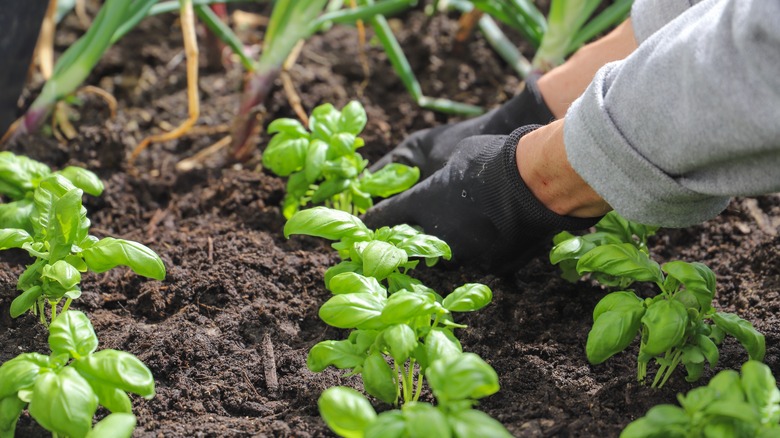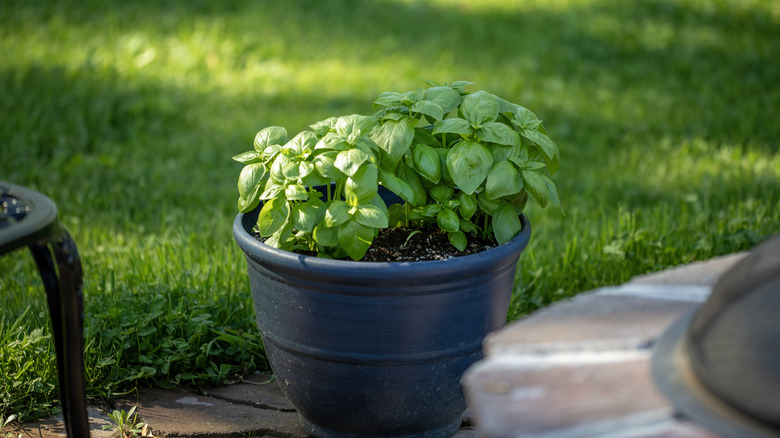For enthusiasts of pesto and admirers of Mediterranean cuisine, basil (Ocimum basilicum) stands out as an essential herb for gardeners to cultivate throughout the warm seasons. Beyond its appealing appearance, brushing against it reveals a delightful aroma. This characteristic alone makes it a standout choice.
Reasons you’ll be eager to plant basil in your garden right away
Aside from the widely cultivated sweet basil, numerous alternative types await your exploration should you wish to explore subtle variations in taste and growing characteristics. Some cultivars boast striking purple foliage that can enhance both your vegetable plot and potted gardens visually.
This leads us to consider whether it’s preferable to cultivate basil directly in the soil or in containers. Generally speaking, planting basil in the ground seems superior; however, upon closer inspection, this isn’t universally true. Both options come with their own set of advantages and disadvantages. The ideal method—whether using pots or planting in-ground—depends largely on your gardening space, available care time, and pest issues like those from slugs and snails. We’ll examine each approach so you can determine what works best for you.
Read more:
The Plant You Might Want to Include in Your Garden for Richer Soil
Advantages And Disadvantages Of Planting Basil Directly In Soil

Overall, growing basil is rather simple, and it requires minimal care. Incorporating basil into your vegetable garden offers numerous advantages, particularly when planted near summertime-producing vegetables such as tomatoes. This fragrant herb not only enhances the flavor of tomato dishes but also thrives alongside them. Hence, tomatoes are among those veggies that
plants that will flourish next to basil in your garden
Basil thrives with ample sunlight, making it ideal for bright garden beds. To ensure it stays properly moist, plant it among other flora that require regular watering, which will help maintain optimal hydration levels. Additionally, frequent harvesting can promote lush, dense foliage growth.
A minor drawback of cultivating basil directly in the soil is that young, delicate shoots can attract common garden pests like slugs and snails; thus, safeguarding them becomes necessary. Another issue could arise if neighboring vegetation casts too much shade over your basil—this oversight might lead to more elongated stems instead of dense bushes brimming with flavorful foliage. Regular pruning then becomes essential to prevent this tall growth and encourage leaf production.
Trimming basil regularly is essential for achieving the highest possible output.
, and it’s something you wouldn’t want to miss.
Pros and Cons of Cultivating Basil in Containers

Should you choose to cultivate your basil in a pot, you can place it conveniently near your kitchen. This makes plucking the leaves swift and effortless. The container allows you to locate the planter in an ideal sunny spot, particularly useful when you lack extensive outdoor space. Additionally, this setup deters pests such as snails and slugs from easily discovering and damaging your basil. Furthermore, if colder night-time temperatures are expected, you can simply move the potted plant inside to protect it.
A significant drawback of cultivating basil in containers is the increased vigilance required for watering since potting soil dries quicker compared to garden earth. The plant suffers from dried-out soil and shows this stress through wilting foliage rather than robust development. Consequently, manual watering must occur every day throughout summertime’s peak warmth. Additionally, applying diluted liquid fertilizers periodically can help maintain your basil plant’s vigor and healthiness.
Therefore, whether you decide to cultivate basil directly in the soil or in a pot depends solely on your preference since both approaches can be quite effective. If you’re someone who only gets some free time during weekends and doesn’t have much spare time for regular watering, planting it in the ground would likely suit you better. Conversely, should you frequently utilize basil but lack ample outdoor gardening area, cultivating it in a container could be ideal for you.
Liked this article? Sign up for expert home tips, DIY guides, and design inspiration from our newsletter.
House Digest newsletter
!
Read the
Original Article from House Digest
.


